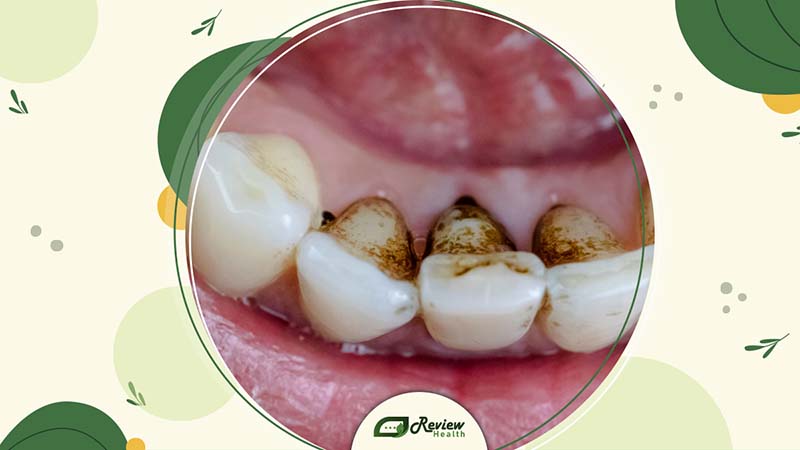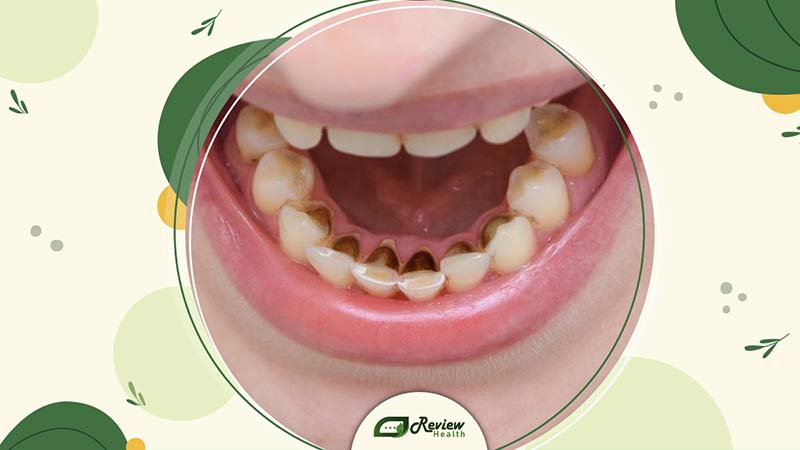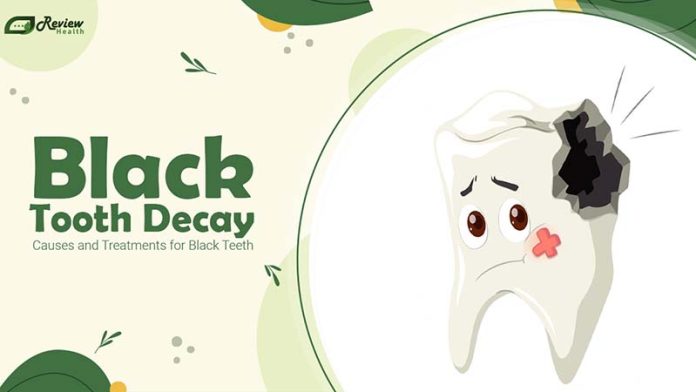Black tooth decay can really affect your smile and your confidence. If you have this problem, it’s important to know what causes it, what the symptoms are, and how to treat it. Keep reading to learn how black tooth decay can impact your oral health and find out the best ways to fix it. This will help you get your smile looking good again. For more detailed advice, check out Review Health.
Why is Black Tooth Decay?
Black teeth can indicate underlying dental issues that shouldn’t be overlooked. Typically, teeth vary in shades from white to pale yellow and light gray, largely due to the calcium content in the enamel. Enamel is the tough, protective outer layer of the teeth.
Teeth are made up of three layers:
- Enamel: The tough outer shell that protects the tooth.
- Dentin: Located just under the enamel, dentin has tiny tubes that let sensations like heat, cold, and acidity reach the nerve endings. When enamel is damaged, the underlying dentin becomes exposed.
- Pulp: At the center of the tooth, containing blood vessels, connective tissue, and nerves.
Teeth turn black due to changes in the color of the enamel. This discoloration can happen from external or internal factors.

External Causes
External factors of blackening stem from the outside of the tooth, include:
- Enamel damage
- Stains
- Tartar accumulation
Direct sources of stains might be:
- Gum or Enamel Trauma: Damage to the gums or tooth enamel can exacerbate the formation and darkening of tartar.
- Certain medications, such as liquid iron supplements
- Specific types of mouth rinses and tubes of toothpaste
- Smoking: Tobacco use is a significant contributor to dental discoloration.
- Dental restorations like crowns and fillings that use materials like silver sulfide
- Diet: Consuming foods high in starch and sugar can accelerate tartar buildup.
Internal Causes
Internally, a tooth might turn black due to damage from the inside, typically from decay or cavities. For instance, a tooth with a pulp infection or a dead tooth can become black.
The deterioration begins inside and eventually affects the surface. Initially, the blackening may appear as spots, spreading to cover the whole tooth if left untreated.
How To Get Rid Of Black Tooth Decay
Black spots on teeth are a common concern and can often be effectively treated. These spots typically result from minor imperfections, such as a small pit or chip that captures stains or harbors a bit of decay. A dentist can address this by removing a small portion of the affected area—eliminating the stain or decay—and then applying a tooth-colored bonding material. This material is designed to match the surrounding teeth, ensuring that the repair blends seamlessly and remains virtually unnoticeable.
Similarly, black lines on the teeth, particularly those near the gum line that may coincide with dental restorations like veneers or crowns, can be treated using dental bonding. This method restores the natural look of the tooth while covering up the unsightly black lines.
For teeth that have died—often appearing gray or black—a whitening treatment using a peroxide-based gel can be employed. While this method can significantly lighten the color of teeth, it may not always be sufficient for reviving the appearance of a dead tooth. In such cases, more comprehensive restorative options like dental veneers or crowns might be necessary. These treatments not only improve the cosmetic appearance but also provide strength and protection to the affected tooth.
Common Symptoms of Black Teeth: A Detailed Look
It’s relatively rare for a tooth to change suddenly from a normal whitish color to black. Typically, there are several warning signs before any noticeable discoloration occurs.
Increased sensitivity is often one of the first symptoms people experience. This sensitivity can cause discomfort or pain when consuming hot, cold, or sweet foods and drinks, indicating that the teeth may be starting to discolor. Additionally, small black dots might begin to appear on the teeth, frequently near the gum line. This is particularly common in children who develop black teeth.

When tartar is the culprit behind black teeth, the discoloration usually appears on the external surfaces of the molars or the internal surfaces of the front teeth.
When tartar is the culprit behind black teeth, the discoloration usually appears on the external surfaces of the molars or the internal surfaces of the front teeth. Tartar can exacerbate staining and unless removed by a dentist, it will continue to accumulate and potentially lead to further enamel erosion. In advanced cases, this erosion can result in visible holes in the teeth.
Top Expert Tips on How to Prevent Black Teeth Effectively
Preventing black teeth involves a combination of good dental hygiene practices and lifestyle adjustments. Here are some effective strategies to keep your teeth healthy and avoid discoloration:
- Brush Regularly: Brush your teeth for about a minute and a half, twice daily, using fluoride toothpaste. This helps remove plaque and prevent tartar build-up that can lead to staining.

- Floss Daily: Flossing once a day is crucial for removing debris and plaque that your toothbrush can’t reach, particularly between the teeth and near the gum line.
- Regular Dental Visits: Schedule regular check-ups and cleanings with your dentist or dental hygienist. These professionals can catch and treat potential issues before they lead to serious discoloration.
- Cut Down on Sugars: Avoid sugary drinks and snacks which can contribute to tooth decay and discoloration.
- Avoid Tobacco: Smoking or using chewing tobacco can cause significant staining of the teeth, so it’s best to avoid these habits entirely.
- Use a Straw: For acidic beverages like soda and juice, using a straw can help minimize contact with your teeth, reducing the risk of acid erosion and staining.

- Don’t Chew Hard Objects: Avoid chewing on ice or hard candy, as these can cause damage to your enamel and lead to cracks where stains can accumulate.
- Eat a Balanced Diet: Incorporating plenty of fruits, vegetables, and whole grains into your diet can help support overall dental health.
- Consult About Medications: If you are taking medications known to stain teeth, discuss with your dentist possible ways to minimize the risk of staining.
FAQ
Is the presence of black teeth a possible indicator of oral cancer?
No, black teeth do not directly indicate oral cancer. They typically signal oral health issues such as decay, infection, or trauma, but are not a specific sign of oral cancer.
Can black teeth be a symptom of Addison’s disease?
No, black teeth are not commonly associated with Addison’s disease. While Addison’s can cause gum hyperpigmentation, it does not typically result in black teeth if the gums appear normal.
Does experiencing a black tooth also mean pain?
Not necessarily. A dying or dead tooth may not cause pain. Some individuals might not experience any discomfort, while others could have mild to severe pain.
Understanding why teeth lose their whiteness: common causes
Teeth may lose their whiteness due to several factors:
- Tooth trauma can cause a tooth to darken.
- Aging results in enamel wear, making teeth appear yellower.
- Genetics may lead to naturally fewer white teeth.
- Excessive fluoride from water or dental products.
- Certain medications, like some antibiotics and antihistamines, cause discoloration.
- Poor dental hygiene and lack of regular dental visits allow plaque buildup and staining.
- Dental materials containing silver sulfide can discolor teeth.
Do black lines on teeth indicate cavities?
No, black lines on teeth are not the same as cavities, although cavities can contribute to their formation. Black lines can also arise from other causes such as tartar buildup or receding gums.
Conclusion
Seeing a dentist is crucial for identifying the cause of black tooth decay, whether it’s from stains, tartar buildup, or decay itself. Professional help is necessary to address this issue properly.
To prevent black tooth decay, maintaining excellent oral hygiene is essential. With thorough brushing, regular flossing, and consistent dental check-ups, you can avoid the recurrence of black tooth decay. For more insights and tips on managing this condition, explore resources like Review Health.

